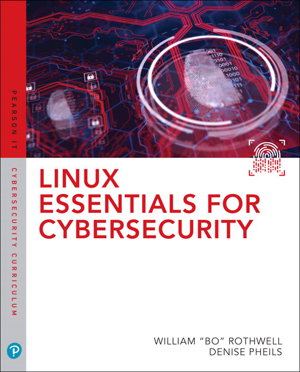| Mon | 9am – 5:30pm |
| Tue | 9am – 5:30pm |
| Wed | 9am – 5:30pm |
| Thu | 9am – 5:30pm |
| Fri | 9am – 7pm |
| Sat | 9am – 5pm |
| Sun | 10am – 5pm |
Ask our staff anything about our shop or products, or share your feedback.

PublishedPearson Certification, September 2018 |
ISBN9780789759351 |
FormatSoftcover, 704 pages |
Dimensions20.2cm × 25cm × 4.4cm |
Linux distributions are widely used by technical professionals to support mission-critical applications and manage crucial data. But safeguarding Linux systems can be complex, and many guides to Linux usage and certification provide only superficial coverage of security.
Linux Essentials for Cybersecurity is the solution. Part of the new Pearson IT Cybersecurity Curriculum (ITCC), it introduces Linux with the primary goal of enforcing and troubleshooting security. Leading Linux certification and security experts William "Bo" Rothwell and Denise Pheils, PhD offer a layered approach to security that helps readers protect their Linux systems even if one or more layers are penetrated. Rothwell and Pheils show how to install Linux to achieve optimal security right from the outset, even if you have no experience with Linux at all. Next the authors present best practices for the secure day-to-day administration of accounts, devices, services, processes, data, networks, and more. To increase readers' sophistication in defending Linux systems, the authors also walk through the use of powerful tools and automated scripting techniques for footprinting, penetration testing, threat detection, logging, auditing, software management, and more. Finally, to help readers earn certification and demonstrate their abilities, the authors cover many key topics found on the CompTIA Linux+ and LPIC-1 certification exams.
This guide's features include:
Logical organisation designed for easy understanding, effective classroom use, and rapid on-the-job-training
Strong emphasis on modern real-world security troubleshooting techniques throughout -- not just in separate sections
Real-world examples and step-by-step activities that permit hands-on practice without expensive equipment
Key terms, chapter objectives, review questions, and more

